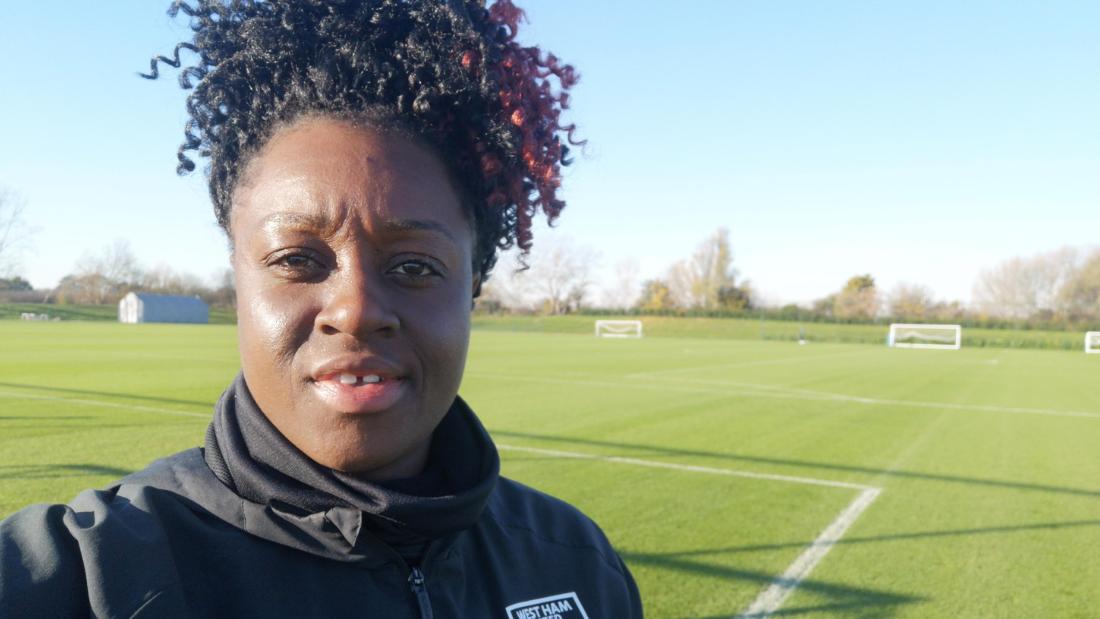
A football coach who has worked with youth and academy teams on both sides of the Atlantic — Chelsea, Arsenal and Reading in England and LA Galaxy and New York Red Bulls in the United States — Farley’s goal is to gain her professional license.
Farley is currently based at Premier League side West Ham having arrived last year as the club’s first ever female coach.
She says her coaching career to date has been driven resilience, self-belief, and a willingness to step out of her comfort zone — qualities that are all the more necessary when you’re a woman working in a male-dominated environment.
“As a female coach, it is tough,” says 34-year-old Farley. “There are always barriers.”
Speaking about some of the day-to-day challenges she has faced as a female football coach, Farley adds: “Sometimes it’s almost like a lack of respect for the role or what you can bring.
“For example, it might be that I’ve got this idea and person B has got that idea, but we take person B’s and it’s like: Well, I’ve said that idea before, but you haven’t really acknowledged it.”
There are also times when she’s reflected on how her career progression has seemed slower compared to some of her peers.
“You think: Well, I’m getting so far, I’m excelling here, but there’s this brick wall and I can’t seem to get any further,” says Farley.
“Whereas you look at someone else and you’re saying: Oh, they started from behind me, they look like they’re excelling […] It can be frustrating and it’s hard. But just keep presenting yourself as being resilient.”
She is now in the middle of a 23-month placement with the club, coaching schoolboy and professional teams across the full range of age groups in the West Ham academy.
According to the Premier League, the aim for coaches on the CIDS is to achieve a sustainable coaching position in which they can be “successful and visible role models” for future generations.
“Sadly, it shouldn’t matter if you’re male, it shouldn’t matter if you’re female, it shouldn’t matter what color you are,” says Farley, “but we know that historically, these barriers exist.
“Even if you look at the female ban of football and you relate that back, well of course women’s football is going to be behind, they’re 50 years behind because there’s a 50-year ban.”
Farley is referring to the period between 1921 and 1971 when the English Football Association banned women from playing at English Football League grounds.
She adds, however, that there has been noticeable “growth and investment” in the women’s game in the UK, and calls being the first ever female coach at West Ham “neat and cool.”
“It shows that these clubs are willing and West Ham is actually coming from an open mindset place by offering that variety,” says Farley.
“Ultimately, the more diverse we are, it can only get better because everyone is so different.”
Last year, the Premier League launched the Coach Index, an online directory for coaches from underrepresented backgrounds to find current vacancies at clubs.
Farley says she doesn’t want to be viewed as a “tick box,” but rather wants to use the opportunity with West Ham to further develop herself as a coach.
“I refer to myself as being in a flowerpot,” says Farley. “I’m a plant and I’m growing, but if someone puts me in a box, I can only show so much. If you take that box off, if you let the sun in, if you let the opportunity arise, well, guess what? I can grow and give so much more.”
Before coaching, she had aspirations of being a player. But two injuries in quick succession while she was playing for Reading put an abrupt end to those hopes as she instead looked to coaching.
“You’re heartbroken,” says Farley, adding: “It was not the same access [to medical care] back then for the female game, so you just got on with it. I didn’t know back then if I could be like [Chelsea and England’s] Fran Kirby, for example, where you can have this long-term career.”
Coaching, however, proved that she could still have a “positive impact” on other players. “I do believe it’s my calling to inspire, through my career, through my journey,” says Farley.
She credits the environment at West Ham as one where you can “be yourself,” and indeed, it is a positive time to be associated with the club.
As well as pushing for a place in the Premier League’s top six come the end of the season, on Thursday, the men’s first team faces Lyon in the quarterfinals of the Europa League — its first European quarterfinal in 41 years.
And while West Ham aims to reach new heights on the field, Farley, ever ambitious, is hoping her time as a coach with the club can follow a similar upward trajectory.
“I’m 100% the competitor, I do love to win in everything I do,” says Farley. “I’ll always want to try and do the best. I like to be successful.”
But whatever happens in her coaching career, her love of the game will always endure.
“The beauty of football, to strip it all back, is you could be anyone from any estate environment; you might be a rich person […] you might be the person who’s grown up in the block of flats,” says Farley.
“Whatever it may be, football brings you together.”